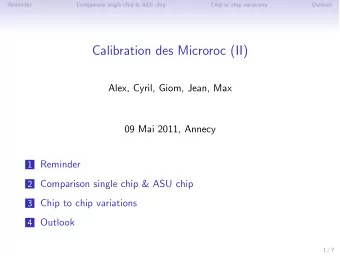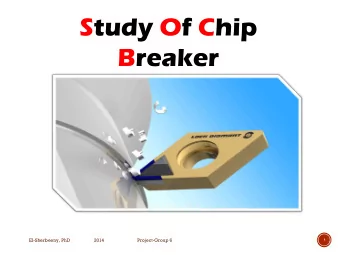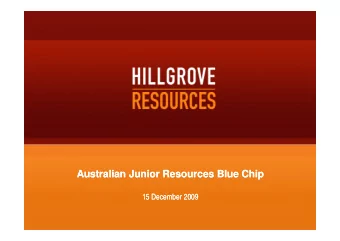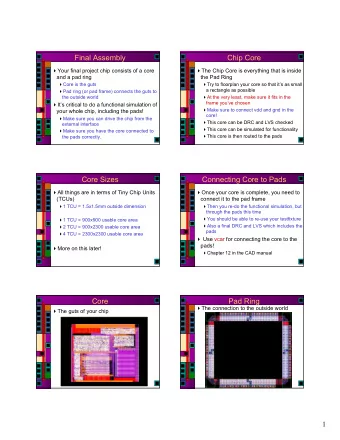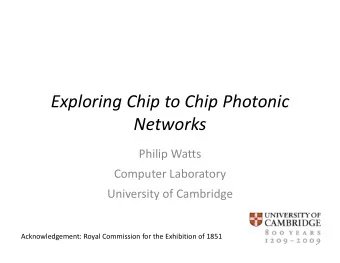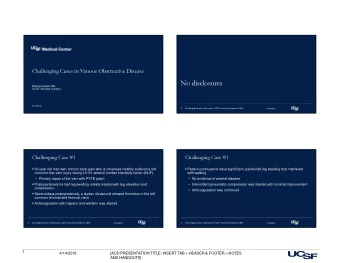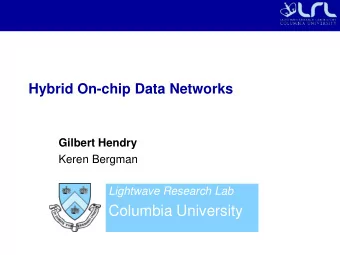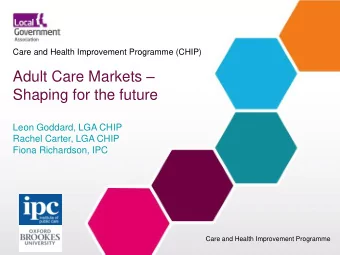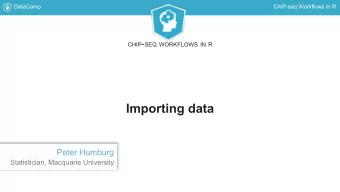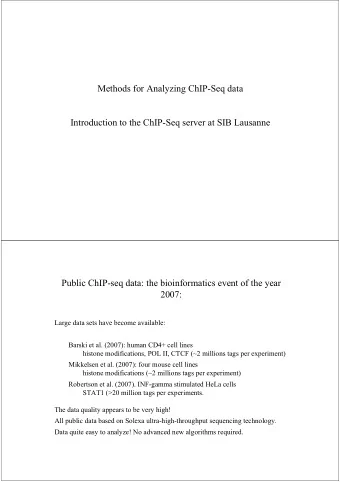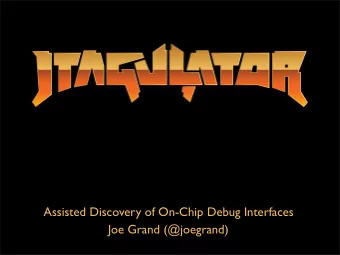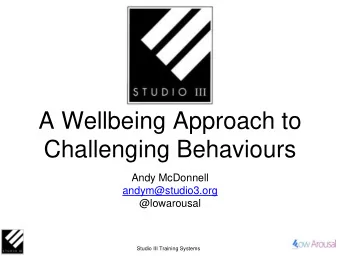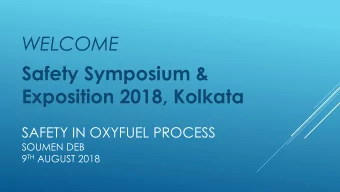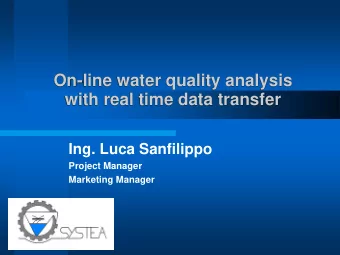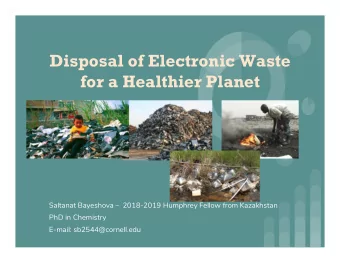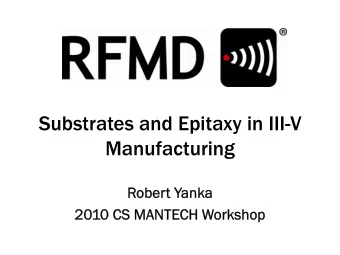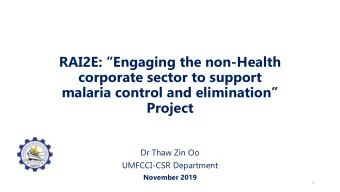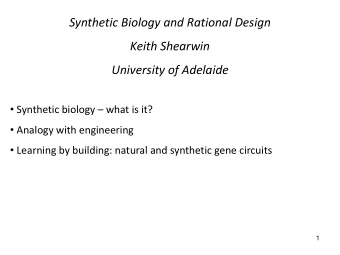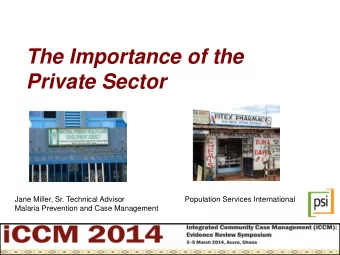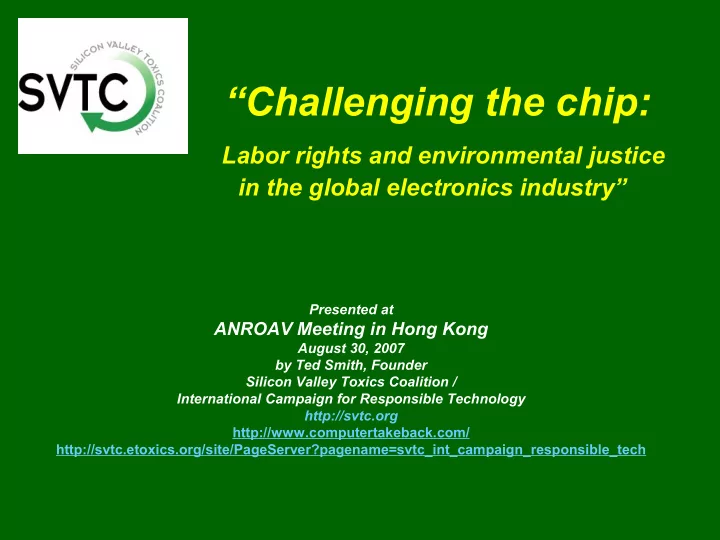
Challenging the chip: Labor rights and environmental justice in the - PowerPoint PPT Presentation
Challenging the chip: Labor rights and environmental justice in the global electronics industry Presented at ANROAV Meeting in Hong Kong August 30, 2007 by Ted Smith, Founder Silicon Valley Toxics Coalition / International Campaign for
“Challenging the chip: Labor rights and environmental justice in the global electronics industry” Presented at ANROAV Meeting in Hong Kong August 30, 2007 by Ted Smith, Founder Silicon Valley Toxics Coalition / International Campaign for Responsible Technology http://svtc.org http://www.computertakeback.com/ http://svtc.etoxics.org/site/PageServer?pagename=svtc_int_campaign_responsible_tech
Our History: Santa Clara Center for Occupational Safety and Health formed in 1970’s • SCCOSH formed Injured Workers United, a support group for workers already affected by chemical exposures, trying to secure fair compensation, decent medical care and retraining. The Silicon Valley Toxics Coalition (SVTC) also started out as an early project of SCCOSH in 1982.
Our Strategy • Industry specific focus – electronics • Unite labor and community struggles • Focus on occupational and environment health • Life cycle approach – mining production use end of life/disposal • Hold the brand names accountable • Grass roots bottom up work with people who are the most impacted
Valley of Heart’s Delight
Unions Organizing Silicon Valley's High Tech Workers by David Bacon • From the beginning, high tech workers had to face an industry-wide anti-union policy. Robert Noyce, who participated in the invention of the transistor, and later became a co-founder of Intel Corp., declared that "remaining non-union is an essential for survival for most of our companies. If we had the work rules that unionized companies have, we'd all go out of business. This is a very high priority for management here. We have to retain flexibility in operating our companies. The great hope for our nation is to avoid those deep, deep divisions between workers and management which can paralyze action."
The wake up call !! Groundwater pollution in Silicon Valley poisons families
The Reality of High Tech Impact • Semiconductor workers experience illness rates 3 times greater than manufacturing workers in other industries • In 3 epidemiological studies, women who worked in fabrication rooms were found to have rates of miscarriage of 40% or more above non-manufacturing workers • Silicon Valley has more EPA Superfund sites than any other area in the USA
Body Burden ( 1000+ Chemicals Used in Electronics Production)
AMRC Handbook - 1985
Earthday 1989 IBM rally: “Stop using CFC’s”
Toxic Components in Computers • Solvents used to make chips, disk drives, etc • Lead and cadmium in circuit boards • Lead and barium in monitors • Brominated flame retardants on printed circuit boards, cables and plastic casing 1 of 2
Toxic Components in Computers • Poly-vinyl chloride (PVC) casings • Mercury switches, flat screens • Brominated flame retardants in plastics 2 of 2
The footprint of high-tech development
Intel case study by SWOP
Intel Inside New Mexico Sucking the Southwest Dry • The explosion of high-tech development in the Southwest means that the region’s already sparse water supplies must meet the needs of one the world’s fastest-growing - and thirstiest - industries. • In 1993, Intel received the largest corporate welfare package in the country’s history to construct a facility in Rio Rancho, New Mexico. Since then the SouthWest Organizing Project (SWOP) has been holding Intel accountable to protect New Mexico’s environment and economy. In New Mexico—the 48th poorest state and the third most arid state in the US—87% of the water used by the top industrial users in the Albuquerque area is by the five high tech companies: Intel, Philips, Sumitomo, Motorola, and Honeywell.
Computer TakeBack Campaign • Take it back • Make it clean • Recycle Responsibly www.computertakeback.com
300 Million Obsolete Computers by 2004 Plastic 4 billion lbs. Lead 1 billion lbs. Cadmium 1.9 million lbs. Chromium 1.2 million lbs. Mercury 400,000 lbs.
Dell Student Activism Helps turn Dell Around
Activists oppose Dell’s use of Prison labor for Computer Recycling
Bad Apple Campaign
SVTC expands as Industry moves out of S.V. Global High-Tech Production is Undergoing the Largest Industrial Expansion in the History of the World
New Fab (Chip Factory) Construction • 127 new fabs in planning & construction – Total to exceed $115 billion – $1 - 3 billion each – 300 mm fabs may double the cost • 200 mm to 300 mm fabs: $14 billion – “Largest industrial transition in history” Source: SEMI
High Tech manufacturing is global
High Tech manufacturing is global (2)
Hitachi workers in Mexico: “Defend our labor rights!”
Japanese electronics found to pollute groundwater • Campaign for Responsible Technology (CRT List Serve Letter #16, Aug 10, 1998) Return to List Serve Archive • The problem with groundwater pollution and the electronics industry is not limited to the United States as reported in the July 25 issue of The Economist. • The Economist, July 25, 1998 Pg. 60
Intel inside Costa Rica By Leslie Byster • Prompted by concerns about Intel's plans to build 2 test and assembly facilities in their country, two activists from Costa Rica recently visited with the Silicon Valley Toxics Coalition and the SouthWest Organizing Project (Albuquerque, NM). Julio Rojas, an epidemiologist at the University of Costa Rica and William Alvarez, a former elected official in Belen, were gathering information about the impacts of high-tech development on local communities like Silicon Valley and Silicon Mesa in New Mexico. Their visit to the US was sponsored by the Campaign for Responsible Technology and the Southwest Network for Environmental and Economic Justice. • SVTC Action Archive Fall, 1997
Chip plants not safe SEMICONDUCTOR PLANTS AREN'T SAFE AND CLEAN AS BILLED, SOME SAY October 5, 1998 By BILL RICHARDS Staff Reporter of THE WALL STREET JOURNAL GREENOCK, Scotland -- At the Inverclyde Advice and Employment Rights Center here, two dozen women crowd around a table. In angry Scottish burrs, they recite a litany of medical problems: cancers, birth defects, multiple miscarriages. "There's a whole lot more who would be here with us," says 61-year-old Doreen Robinson, who has breast cancer. "But they're already dead."
RCA Workers in Taiwan
ICRT – GAIA signing ceremony Concerned about the shipment of e-waste to Asia, representatives of organizations attending the Waste Not Asia 2001 conference in Taiwan signed the CTBC Platform
Taiwan workers plead cancer case Link RCA plant to disease Matthew Yi, Chronicle Staff Writer Friday, May 24, 2002 While many laud the globalization of technology as a positive force that spreads the wealth and helps industry grow, a group of Taiwanese workers came to Silicon Valley Thursday to tell a different story. Their tale has to do with a former RCA facility in Taiwan's northern county of Taoyuan. More than 1,000 former employees of that facility are suffering from cancer and more than 200 have died, according to the visiting workers, who used to make TVs and semiconductors.
E-Waste Dumped in Guiyu, China
Women sorting wires to burn in China
Burning E-Waste in Guiyu, China
The Digital Dump A new report on e-waste dumping in Africa by the Basel Action Network October 24, 2005
Global e-waste dumping
Bejing Conference on Clean Production and E-Waste
E-Waste and Clean Production Conference in Bejing – April 2004
International Campaign for Responsible Technology (ICRT) Global Symposium on Strategies for a Sustainable High-Tech Industry November 14-17, 2002 San Jose, CA http://www.svtc.org/icrt/index.html
Activists gather at First Symposium on Global Strategies for a Sustainable High-Tech Industry
International Campaign for Responsible Technology (ICRT) Draft Mission Statement, adopted November 16, 2002 • We are an international solidarity network that promotes corporate and government accountability in the global electronics industry. We are united by our concern for the lifecycle impacts of this industry on health, the environment and workers' rights.
From Silicon Glen to Silicon Valley: Jim & Helen
ICRT delegation visits National Semiconductor
ICRT takes on SIA
Forward to Challenging the Chip • “We need a lot more “people’s histories” like those in this book. The stories of brave and creative women and men who fight back when their lives and their children’s lives are threatened. These are the stories of people challenging the corporate elite and speaking truth to power – whether the power be the corporations or the governments that allow these practices to continue. Such stories teach us that when people come together across traditional boundaries – geographic, political, racial, etcetera – they can actually change the world.” – Jim Hightower, former state elected official in Texas
Book tour at Beijing University
Book release in Bangalore
Recommend
More recommend
Explore More Topics
Stay informed with curated content and fresh updates.
